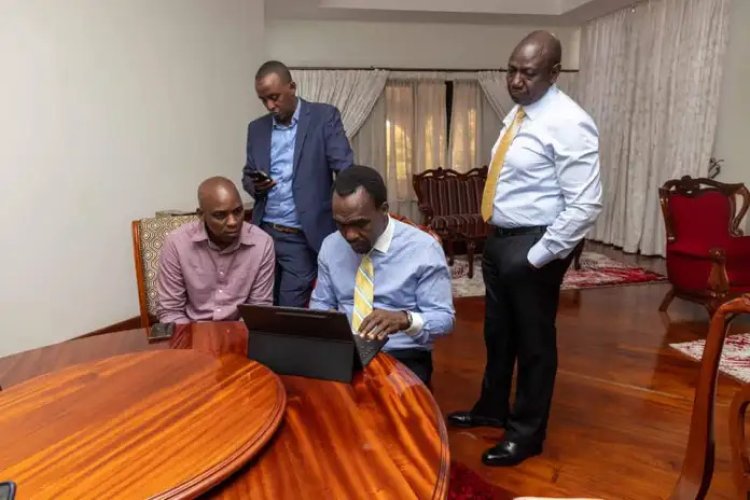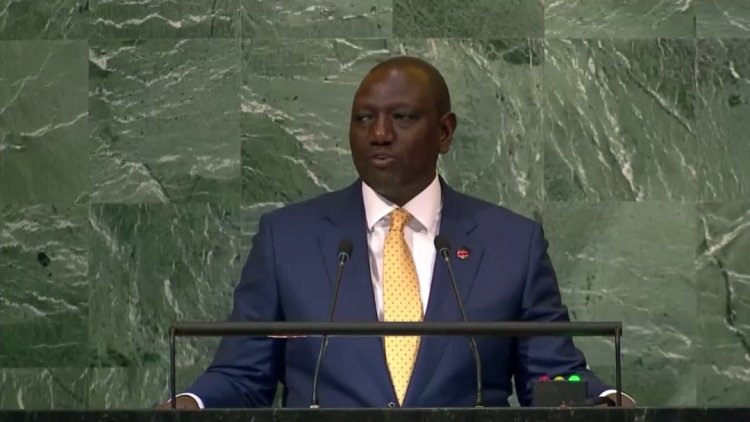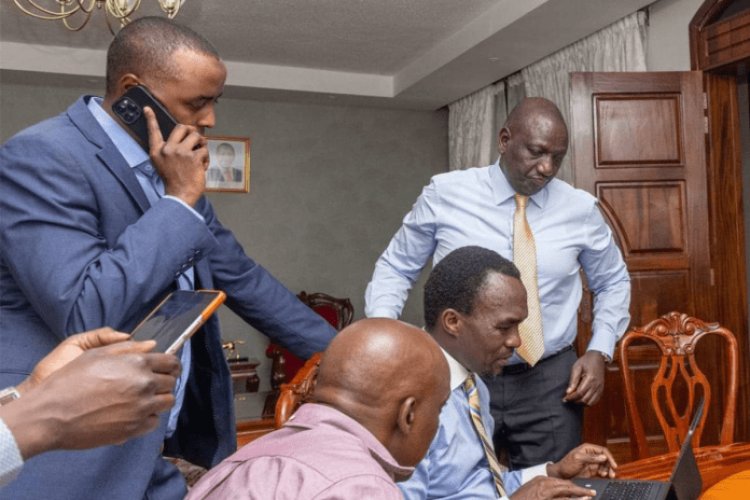Eric Ng'eno: Meet Lawyer Behind Ruto's Powerful Speeches
The speeches grew stronger, starting with his inauguration speech on Tuesday, September 13 and the speech at the 77th United Nations General Assembly (UNGA) in New York, United States (US),

To win the 2022 general elections, President William Ruto assembled a formidable team of communication experts tasked with selling his image to members of the public.
One of the key areas of specialisation that proved to be a major turning point in his road to victory in the polls happens to be his speeches, with a mixture of simple and elite English words and letters carefully woven into a speech that well communicates the Kenya Kwanza vision.
After the win, the speeches grew stronger, starting with his inauguration speech on Tuesday, September 13 and the speech at the 77th United Nations General Assembly (UNGA) in New York, United States (US), arguably the best of the lot.
Ruto had touched on the international realities and challenges facing the global economy and had rallied world leaders in attendance for the pan-Africanisation of the multilateral system.

President William Ruto speaking during the UN General Assembly on September 21, 2022. /FILE
However as Kenyans continue to celebrate Ruto's eloquence and mastery in the UNGA speech, one name comes to mind as the genius who has also done the speeches of former President Uhuru Kenyatta. Meet lawyer Eric Ng'eno.
Ng'eno served in Uhuru's Jubilee government at State House authoring speeches for the former Head of State, which means that the current task of penning Ruto's speeches is nothing new to him.
That was his job from May 2013 to June 2020 as per his LinkedIn profile before moving to Kipsang & Mutai Advocates as a Partner in charge of Litigation, Research, and Legal Advisory.
Ng'eno first met Ruto during the aftermath of the 2007/08 post election violence (PEV). Initially, he conducted research and secretarial services for him during the Serena negotiations that yielded the National Accord after the PEV.
Ruto at the time was looking for someone with a legal background as well as excellent communication and writing skills.
“Initially, I didn’t understand why communication skills were that important for him. But he was clearly farsighted. When the Grand Coalition Government was formed, he was appointed Minister for Agriculture.
"As a minister, Hon Ruto wanted technical materials to be packaged in a language that could be used to successfully engage a national audience. He is rather good at it, and we spent lots of time going through a lot of documents and prepping him for presentations at various levels,” Ng’eno revealed in a past interview with The Standard.
Ruto had contracted him to do a speech he was to give during an event at Moi University. Ng'eno tasked his juniors with the assignment and later presented Ruto with the speech, but was disappointed and dismissed it before asking Ng'eno to do it himself.
“Since we were on our way to Wilson Airport, and I had less than an hour to put something together. I found a computer and produced a brief speech.
"When he returned, he told me that he liked it. So, I became his messaging resource person for Press statements, speeches, briefs, presentations and other communication,” he recalled.
Ng'eno was introduced to Uhuru when they were drafting the United Republican Party (URP) manifesto in 2012 and since then, he worked with them both until his unceremonious exit.
He worked as President Kenyatta’s speech writer for over seven years before he and four other members of the communication team were suspended from the Presidential Strategic Communications Unit (PSCU) over alleged inconsistent messaging.
President Ruto’s Digital Strategist Dennis Itumbi along with external press director Munyori Buku and events director James Kinyua were among those fired by Uhuru. Together with Ng’eno, the three joined Ruto’s communications team, serving alongside Communication Secretary David Mugonyi and Director of Communication Emmanuel Tallam.
Ng'eno is an alumni of Alliance High School where he attended between 1991 and 1994 before proceeding to Moi University where he graduated from with a Bachelor of Laws degree. He joined Strathmore Business School in 2015 for a Masters in Public Policy and Management.
He has experience in commercial, legal, legislative, public policy, and regulatory affairs, as well as legal and regulatory compliance audits, QMS audits, research consultation, and facilitation. He also has a background in political, government and strategic communication.

President William Ruto with his communications team working on his speech. /TWITTER
He credits Ruto as driven by high standards and will always work to ensure that he delivers. He has been quoted saying that the president appreciates technical materials packaged in a manner that can be used to successfully pull millions of Kenyans.
The lawyer notes that writing speeches for the president is a process that is broken down to different assignments delivered using different formats.
Some speeches for instance are products of quick one-on-one consultations whereas others are instructions transmitted through official channels. Others are put together over a period of time by large teams of high-level technical people.
“Messaging is not necessarily substantive technical material development. It is simply reducing all those things into a language that the president is accustomed to in terms of cadence, rhetorical quality, and key message projection and so on.
“I usually work with one draft, sometimes two or three, not more. When a large team is involved, it is not uncommon to see more than five drafts. My legal training helps. I take my instructions the way advocates are trained to take their clients’ briefs. Usually, we reduce these instructions into research assignments, opinions, pleadings, affidavits, contracts and so on," he narrated.
Ng’eno also noted that the length of his speeches depends on the occasion, giving an example of The State of the Nation address which cannot be compressed into a 10-minute affair due to the nature of critical constitutional and political expectations to be canvassed.
He does Ruto's speeches alongside other members of the PSCU and the Spokesperson who he notes, likes to ensure that key government messages are embedded in every speech, subject to relevance.

 admin
admin 




